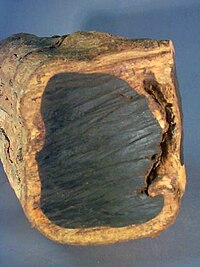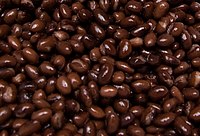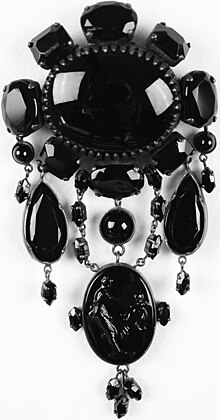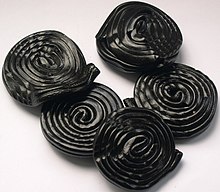| Black | |
|---|---|
| Common connotations | |
| Darkness, evil, luxury, mourning, Halloween | |
| Hex triplet | #000000 |
| sRGB (r, g, b) | (0, 0, 0) |
| HSV (h, s, v) | (0°, 0%, 0%) |
| CIELChuv (L, C, h) | (0, 0, 0°) |
| Source | X11/By definition |
| B: Normalized to (byte) | |
Shades of black, or off-black colors, are colors that differ only slightly from pure black. These colors have a low lightness. From a photometric point of view, a color which differs slightly from black always has low relative luminance. Colors often considered "shades of black" include onyx, black olive, charcoal, and jet.
These colors may be considered for part of a neutral color scheme, usually in interior design as a part of a background for brighter colors. Black and dark gray colors are powerful accent colors that suggest weight, dignity, formality, and solemnity.
In color theory, a shade is a pure color mixed with black. It decreases its lightness while nearly conserving its chromaticity. Strictly speaking, a "shade of black" is always a pure black itself and a "tint of black" would be a neutral gray. In practice, many off-black colors possess a hue and a colorfulness (also called saturation).
Black
Main article: BlackBlack is a color, the perception of which is evoked by the total absence of light that stimulates any of the three types of color sensitive cone cells in the human eye and with very low brightness compared to the surroundings. A black visual stimulation will be void of hue and grayness. Black is the darkest possible color.
Technical black varieties
Surface treatments to reflect as little light as possible have been developed throughout history, usually based on carbon. Intensive research to approach the ideal black body (which would absorb all incident electromagnetic radiation) though has emerged mainly in the 21st century. Important technical blacks include carbon black, super black and Vantablack.
In printing, rich black uses 100% black ink with the addition of other inks to achieve a blacker color.
Variations of black (off-black colors)
The colors are arranged in order of value or brightness, with the lightest colors at the top and the darkest at the bottom.
Dim gray
| Dim gray | |
|---|---|
| Hex triplet | #696969 |
| sRGB (r, g, b) | (105, 105, 105) |
| HSV (h, s, v) | (0°, 0%, 41%) |
| CIELChuv (L, C, h) | (44, 0, 0°) |
| Source | X11 |
| ISCC–NBS descriptor | Dark gray |
| B: Normalized to (byte) | |
Dim gray
#696969
The web color dim gray is a dark tone of gray.
The color name dim gray first came into use in 1987, when this color was formulated as one of the colors on the X11 color list, introduced that year. After the invention of the World Wide Web in 1991, these colors became known as the "X11 web colors".
Cool black
| Cool black (PMS 295) | |
|---|---|
| Hex triplet | #002E63 |
| sRGB (r, g, b) | (0, 46, 99) |
| HSV (h, s, v) | (212°, 100%, 39%) |
| CIELChuv (L, C, h) | (19, 41, 255°) |
| Source | |
| ISCC–NBS descriptor | Very dark blue |
| B: Normalized to (byte) | |
Cool black
#002E63
Cool black is a dark shade of blue. It is one of the Pantone colors.
Ebony
| Ebony | |
|---|---|
| Hex triplet | #555D50 |
| sRGB (r, g, b) | (85, 93, 80) |
| HSV (h, s, v) | (97°, 14%, 36%) |
| CIELChuv (L, C, h) | (38, 10, 113°) |
| Source | Maerz and Paul |
| ISCC–NBS descriptor | Grayish olive green |
| B: Normalized to (byte) | |
Ebony
#555D50
The color ebony is a representation of the color of the wood ebony, a tropical hardwood widely used to make fine furniture, notably for French kings.
The first use of ebony as a color name in English was in 1590.

Davy's grey
| Davy's gray | |
|---|---|
| Hex triplet | #555555 |
| sRGB (r, g, b) | (85, 85, 85) |
| HSV (h, s, v) | (0°, 0%, 33%) |
| CIELChuv (L, C, h) | (36, 0, 0°) |
| Source | ISCC-NBS |
| ISCC–NBS descriptor | Dark gray |
| B: Normalized to (byte) | |
Davy's Grey
#555555
Davy's gray is a dark gray color, made from powdered slate, iron oxide and carbon black named for Henry Davy.
The first recorded use of Davy's gray as a color name in English was in the 19th century (precise date uncertain).
Charcoal
| Charcoal | |
|---|---|
| Hex triplet | #36454F |
| sRGB (r, g, b) | (54, 69, 79) |
| HSV (h, s, v) | (204°, 32%, 31%) |
| CIELChuv (L, C, h) | (28, 12, 231°) |
| Source | ISCC-NBS |
| ISCC–NBS descriptor | Dark grayish blue |
| B: Normalized to (byte) | |
Charcoal
#36454F
Charcoal is a color that is a representation of the dark gray color of burned wood.
The first recorded use of charcoal as a color name in English was in 1606.

Outer Space
| Outer Space | |
|---|---|
| Hex triplet | #414A4C |
| sRGB (r, g, b) | (65, 74, 76) |
| HSV (h, s, v) | (191°, 14%, 30%) |
| CIELChuv (L, C, h) | (31, 5, 208°) |
| Source | Crayola |
| ISCC–NBS descriptor | Dark grayish green |
| B: Normalized to (byte) | |
Outer Space
#414A4C
The color Outer Space was formulated by Crayola in 1998.
Taupe
Main article: Taupe| Taupe | |
|---|---|
| Hex triplet | #483C32 |
| sRGB (r, g, b) | (72, 60, 50) |
| HSV (h, s, v) | (27°, 31%, 28%) |
| CIELChuv (L, C, h) | (26, 11, 47°) |
| Source | ISCC-NBS |
| ISCC–NBS descriptor | Dark grayish yellowish brown |
| B: Normalized to (byte) | |
Taupe
#483C32
The color displayed at right matches the color sample called taupe referenced below in the 1930 book A Dictionary of Color, the world standard for color terms before the invention of computers. However, the word taupe is currently often used to refer to lighter shades of taupe, and therefore another name for this color is dark taupe.
The first use of taupe as a color name in English was in the early 19th century (exact year is not known).
Black bean
| Bean | |
|---|---|
| Hex triplet | #3D0C02 |
| sRGB (r, g, b) | (61, 12, 2) |
| HSV (h, s, v) | (10°, 97%, 24%) |
| CIELChuv (L, C, h) | (11, 28, 17°) |
| Source | Xona.com |
| B: Normalized to (byte) | |
Black Bean
#3D0C02
Black bean is a color that resembles black beans. It is on the Xona.com Color List, which was formulated in 2001.

Black olive
Main article: Olive (color) § Black olive| Olive (RAL) | |
|---|---|
| Hex triplet | #3B3C36 |
| sRGB (r, g, b) | (59, 60, 54) |
| HSV (h, s, v) | (70°, 10%, 24%) |
| CIELChuv (L, C, h) | (25, 4, 93°) |
| Source | RAL |
| ISCC–NBS descriptor | Dark grayish olive green |
| B: Normalized to (byte) | |
Black Olive
#3B3C36

Black olive is a representation of the color of black olives. Also known as olive, color No. 6015, in the RAL color matching system, widely used in Europe.
Onyx
| Onyx | |
|---|---|
| Hex triplet | #353839 |
| sRGB (r, g, b) | (53, 56, 57) |
| HSV (h, s, v) | (195°, 7%, 22%) |
| CIELChuv (L, C, h) | (23, 2, 214°) |
| Source | Crayola |
| ISCC–NBS descriptor | Greenish black |
| B: Normalized to (byte) | |
Onyx
#353839
The color onyx is a representation of the color of onyx.
This is one of the colors in the Crayola specialty crayon set called "Gem Tones", introduced in 1994.

Jet
| Jet | |
|---|---|
| Hex triplet | #343434 |
| sRGB (r, g, b) | (52, 52, 52) |
| HSV (h, s, v) | (0°, 0%, 20%) |
| CIELChuv (L, C, h) | (22, 0, 0°) |
| Source | ISCC-NBS |
| ISCC–NBS descriptor | Black |
| B: Normalized to (byte) | |
| Jet black (RAL 9005) | |
|---|---|
| Hex triplet | #0E0E10 |
| sRGB (r, g, b) | (14, 14, 16) |
| HSV (h, s, v) | (240°, 12%, 6%) |
| CIELChuv (L, C, h) | (4, 1, 266°) |
| Source | RAL Classic |
| ISCC–NBS descriptor | Black |
| B: Normalized to (byte) | |
Jet
#343434
Jet black (RAL 9005)
#0E0E10
The color jet, also called jet black, is a representation of the color of the mineraloid jet.
The first recorded use of jet as a color name in English was in 1450.


Raisin black
Main article: Raisin black| Raisin Black | |
|---|---|
| Hex triplet | #242124 |
| sRGB (r, g, b) | (36, 33, 36) |
| HSV (h, s, v) | (300°, 8%, 14%) |
| CIELChuv (L, C, h) | (13, 2, 308°) |
| Source | ISCC-NBS |
| ISCC–NBS descriptor | Black |
| B: Normalized to (byte) | |
Raisin Black
#242124
Raisin black is a color that is a representation of the color of black raisins.

Charleston green
| Charleston green | |
|---|---|
| Hex triplet | #232B2B |
| sRGB (r, g, b) | (35, 43, 43) |
| HSV (h, s, v) | (180°, 19%, 17%) |
| CIELChuv (L, C, h) | (17, 3, 192°) |
| Source | |
| ISCC–NBS descriptor | Blackish green |
| B: Normalized to (byte) | |
Charleston Green
#232B2B
According to a popular story, the color Charleston green originated after the American Civil War, when the North provided black paint to the South for use in its reconstruction. The inhabitants of Charleston, South Carolina mixed the black with a little bit of yellow and blue and created Charleston green. The earliest known use of the term to describe a dark shade of greenish black is 1953.
Since this color has a hue code of 180, it is actually an extremely dark shade of cyan. The paint manufacturer Duron/Sherwin-Williams paint color number for "historic Charleston green" is DCR099—the color sample at right was taken from this color swatch (hex code #232B2B), which is on the website accessible called Colors of Historic Charleston. This color looks black unless the sun hits it just right, and then the color registers a very dark forest green. From Rust-Oleum paint company it is color No. 214086 but still looks black on color cards.
Eerie black
| Eerie black | |
|---|---|
| Hex triplet | #1B1B1B |
| sRGB (r, g, b) | (27, 27, 27) |
| HSV (h, s, v) | (0°, 0%, 11%) |
| CIELChuv (L, C, h) | (10, 0, 0°) |
| Source | Crayola |
| ISCC–NBS descriptor | Black |
| B: Normalized to (byte) | |
Eerie Black
#1B1B1B
The color eerie black was formulated by Crayola in the early 2000s as one of the colors in its Heads 'n Tails specialty box of colors.
Licorice
Main article: Licorice| Licorice | |
|---|---|
| Hex triplet | #1A1110 |
| sRGB (r, g, b) | (26, 17, 16) |
| HSV (h, s, v) | (6°, 38%, 10%) |
| CIELChuv (L, C, h) | (6, 3, 19°) |
| Source | Crayola |
| ISCC–NBS descriptor | Black |
| B: Normalized to (byte) | |
Licorice
#1A1110
The color licorice (also known as light black) was introduced by Crayola in 1994 as one of the colors in its specialty Crayola Magic Scent crayons with the scent of licorice candy.

See also
References
- Pile, John F. Interior Design Upper Saddle River, New Jersey:2007 Prentice-Hall p. 316
- West FitzHugh, Elisabeth; Winter, John (1986). "Pigments based on Carbon". In Berrie, Barbara H. (ed.). Artists' Pigments: A Handbook of Their History and Characteristics. Vol. 4. National Gallery of Art. pp. 1–37. ISBN 9781904982234.
- Bond, Tami C.; Bergstrom, Robert W. (2006-01-01). "Light Absorption by Carbonaceous Particles: An Investigative Review". Aerosol Science and Technology. 40 (1): 27–67. Bibcode:2006AerST..40...27B. doi:10.1080/02786820500421521. ISSN 0278-6826. S2CID 11746255.
- "Mini craters key to 'blackest ever black'". Newscientist.com. 6 February 2003. Retrieved 2015-07-14.
- Theocharous, E.; Deshpande, R.; Dillon, A. C.; Lehman, J. (2006). "Evaluation of a pyroelectric detector with a carbon multiwalled nanotube black coating in the infrared". Applied Optics. 45 (6): 1093–7. Bibcode:2006ApOpt..45.1093T. doi:10.1364/AO.45.001093. PMID 16523768.
- "PANTONE 295 C". Pantone. Retrieved 2021-12-04.
- Maerz and Paul A Dictionary of Color New York: 1930 McGraw-Hill p. 194
- "Retsof online version of ISCC-NBS Dictionary of Colo(u)r Names - Da through Dz". December 27, 2017. Archived from the original on 27 December 2017.
- Paterson, Ian (2003), A Dictionary of Colour (1st paperback ed.), London: Thorogood (published 2004), p. 134, ISBN 1-85418-375-3, OCLC 60411025, retrieved 2020-04-15
- Eastaugh, Nicholas; Walsh, Valentine; Chaplin, Tracey; Siddall, Ruth (2004), Pigment Compendium: A Dictionary of Historical Pigments, Butterworth-Heinemann, p. 139, ISBN 978-0-7506-5749-5, OCLC 56444720, retrieved 2020-04-15
- Maerz and Paul A Dictionary of Color New York: 1930 McGraw-Hill p. 194; Color Sample of Davy's Grey: p.. 117 Plate 47 Color Sample A4
- "Retsof online version of ISCC-NBS Dictionary of Colo(u)r Names - Ca through Cz". January 6, 2018. Archived from the original on 6 January 2018.
- Maerz and Paul. A Dictionary of Color. New York: McGraw-Hill, 1930. p. 192; color sample: . 117, plate 47 Color Sample A2 – Charcoal
- "Retsof online version of ISCC-NBS Dictionary of Colo(u)r Names - Ta through Tz". December 28, 2017. Archived from the original on 28 December 2017.
- Maerz and Paul A Dictionary of Color New York: 1930 McGraw-Hill p. 205; Discussion of Color Taupe, p. 183; Color Sample of Taupe: p. 55 Plate 16 Color Sample A6
- "Xona Games - Color List". xona.com.
- "RAL Color Chart | www.RALcolor.com".
- "Retsof online version of ISCC-NBS Dictionary of Colo(u)r Names - Ja through Jz". December 27, 2017. Archived from the original on 27 December 2017.
- "RAL 9005 Jet black (RAL Classic) | RALcolorchart.com". www.ralcolorchart.com.
- Maerz and Paul. A Dictionary of Color. New York: McGraw-Hill, 1930. p. 197
- "Retsof online version of ISCC-NBS Dictionary of Colo(u)r Names - Ra through Rz". January 15, 2018. Archived from the original on 15 January 2018.
- "'Blitz Painting' To Start Today". News and Courier. Charleston, South Carolina. April 7, 1953.
- "Duron Paints—Colors of Historic Charleston—Charleston Green". Retrieved 20 November 2017.
External links
| Shades of black | |
|---|---|
| A typical sample is shown for each name; a range of color-variations is commonly associated with each color-name. |
| Shades of gray | |
|---|---|
| A typical sample is shown for each name; a range of color-variations is commonly associated with each color-name. |
| Goth subculture | |
|---|---|
| Associated music | |
| Notable bands | |
| Notable figures | |
| Regional scenes | |
| Notable club nights | |
| Notable events | |
| Art and fashion | |
| Film and literature | |
| See also | |
| Color topics | ||||||||||
|---|---|---|---|---|---|---|---|---|---|---|
| Color science |
|  | ||||||||
| Color philosophy |
| |||||||||
| Color terms |
| |||||||||
| Color organizations | ||||||||||
| Names |
| |||||||||
| Related | ||||||||||
| Color classifications | |
|---|---|
| Color systems, standards and palettes |
|
| Color names (alphabetic) | |
| Variations of base colors | |




